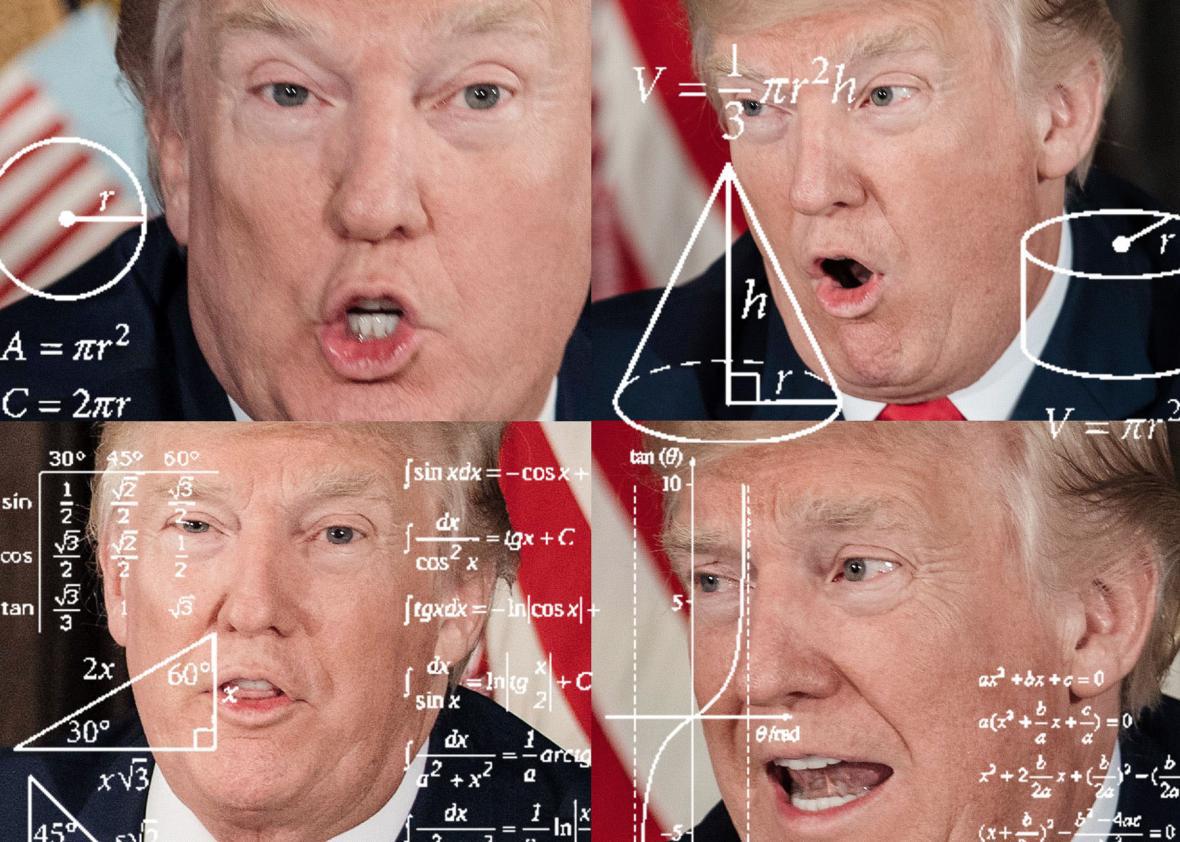On Tuesday, President Trump, hepped up on news that North Korea had successfully miniaturized a nuclear warhead, warned Kim Jong-un that further threats to the United States “will be met with fire and fury like the world has never seen.” Two days later, speaking to reporters at his New Jersey golf course, the macho commander in chief declared that perhaps his initial statement “wasn’t tough enough”—that something about the combination of “fire” and “fury” and world-historical destruction said Trump is a wuss. Tomorrow, perhaps he will pledge to crisp North Korea as black as a well-prepared steak.
The president’s original boast—described by the New York Times as “improvised”—has been subject to the kind of Talmudic analyses that no Trump outburst deserves. Here are a few of the motivations experts have ascribed to the man who holds our lives in his vulgarian fists. May the subtlety of his calculations give us comfort in the milliseconds before we die.
Trump is not a kid on a sugar high playing Power Rangers. He is … sending a veiled notice to China.
Joseph S. Nye Jr., former head of the U.S. National Intelligence Council, told the New York Times that Trump’s words may constitute “a very rational, thought-out message.” To wit, they “may have been aimed as much at Beijing as at Pyongyang,” indicating to Chinese President Xi Jinping that “the status quo is dangerous because it risks war,” the Times explained.
Trump is not an ape throwing bananas at chief of staff John Kelly. He is … deploying his expert grasp of Kim Jong-un’s psyche.
Noting that North Korea has a habit of enveloping its enemies in rhetorical flames, some Trump supporters suggested the president is adopting an approach he knows will resonate with his audience. “The normal nuanced diplomatic rhetoric coming out of Washington hasn’t worked in persuading the Kim regime of American resolve,” said Mark Dubowitz, chief executive of the Foundation for Defense of Democracies. “This language underscores that the most powerful country in the world has its own escalatory and retaliatory options.” Secretary of State Rex Tillerson echoed: “What the president was doing was sending a strong message to North Korea in language that Kim Jong-un would understand, because he doesn’t seem to understand diplomatic language. … I think it was important that he deliver that message to avoid any miscalculation on their part.”
Trump is not a sentient rage emoji exiled from Steve Bannon’s iPhone. He is … slyly reminding Kim of what happened in Hiroshima and Nagasaki after Japan bombed the United States.
In a different New York Times article, presidential historian Michael Beschloss pointed out that 45’s blustery remarks evoke a 1945 address by Harry Truman in the wake of America’s nuclear attack on two Japanese cities. If the enemy refused to surrender after Hiroshima, Truman warned, “they may expect a rain of ruin from the air, the like of which has never been seen on this earth.” Perhaps Trump’s saber rattling was intended to summon the specter of that past retaliation, Beschloss said.
Trump is not a stock character from a health class informational video about bullying. He is … flipping the script to lift U.S. foreign relations out of their rut.
Trump could be “upending the established protocols of diplomacy in efforts to bring about a better outcome,” the Times surmised.
Trump is not a literal madman. He is … employing madman theory.
This tenet of Richard Nixon’s foreign policy, name-checked in a New York Times video on Wednesday, holds that a sane and rational statesman might get his way by tricking his adversary into thinking he’s a loon. “Consider the possibility that [Trump] may be more calculating and deliberate than anybody gives him credit for,” wrote Barton Swaim in the Washington Post in 2016. The president’s “studied unpredictability … may prove more effective for Trump than it ever did for Nixon,” as any “foreign leader who feels he or she has got the measure of [Trump] … is an idiot.”
Trump is not a Google Chrome extension that converts time-tested diplomatic techniques into the dumbest shit you ever heard. He is … the living embodiment of a tradition of tough deterrence.
In the New York Times, Victor Cha, a former National Security Council official, compared POTUS’s hotheaded words to a 1993 Bill Clinton speech, in which the then-president vowed that should North Korea ever use nuclear weapons, “it would be the end of their country.” “I take Trump’s statement in the same spirit,” Cha said, as “a message of deterrence,” a clear signal that aggression from Pyongyang would have devastating results.
There you have it, fellow Americans. Trump’s bellicose word vomit is actually a Fabergé egg of canny intention, a precisely engineered dance step in a highly choreographed strategic samba. When the president’s threats cause Kim to menace Guam with an ocean of fire, you know the plan is working!
Meanwhile, as the nation’s foreign affairs experts cling to the dream that Trump knows the difference between the Diet Coke button and the one that nukes the world, this multitude of interpretations makes me fear for the future of diplomacy. If Trump’s chest puffing both breaks with and continues American tradition, if it conveys simultaneous cunning and madness, if it is fashioned primarily for Chinese ears but also expressly for Korean ones, what is the point of any of this signaling? What does anything mean? Hopefully not that we are all going to die extremely soon. But if we do, I hope the Times stays in business just long enough to find a guy at a think tank to opine about how that enormous mushroom cloud is really just a clever signal to China.
